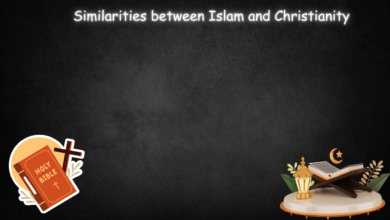Where is God in Islam?
Introduction
Islam, one of the world’s major monotheistic religions, has a profound understanding of the divine presence and the nature of God. Central to the Islamic faith is the belief in the oneness of God, or Allah in Arabic. The concept of God in Islam is multifaceted, encompassing His transcendence, immanence, and attributes. This article aims to explore the various dimensions of where God is situated within the framework of Islam.
The Transcendent Creator
In Islam, God is primarily understood as the Creator of the universe, existing independently of His creation. He is transcendent, beyond the confines of space and time. Muslims believe that God is not confined or limited by the physical world; He is beyond human comprehension and imagination. The Quran, Islam’s holy book, emphasizes God’s transcendence in numerous verses, such as: “There is nothing like unto Him, and He is the Hearing, the Seeing” (Quran 42:11).
God’s Immanence
While God’s transcendence is a fundamental aspect of Islamic theology, His immanence is also acknowledged. Islam teaches that God is close to His creation, sustaining and guiding it. Muslims believe that God’s presence is felt through His signs, which are evident in the natural world and in human experiences. The Quran states, “And We are closer to him than [his] jugular vein” (Quran 50:16), indicating God’s intimate connection with each individual.
The Attributes of God
Islam teaches that God has many attributes that reflect His nature and qualities. These attributes are often divided into two categories: the attributes of majesty (Jalal) and the attributes of beauty (Jamal). The attributes of majesty emphasize God’s power, greatness, and authority, while the attributes of beauty highlight His mercy, compassion, and love.
Some of the most prominent attributes include:
Mercy (Rahman and Rahim): These attributes emphasize God’s compassion and care for His creation. Muslims often begin various tasks with the phrase “Bismillah ar-Rahman ar-Rahim,” meaning “In the name of Allah, the Most Gracious, the Most Merciful.”
All-Knowing (Alim): God’s omniscience is a central aspect of Islamic theology. Muslims believe that God has complete knowledge of all things, including the past, present, and future.
All-Powerful (Qadir): Islam teaches that God has ultimate power and control over everything in the universe.
Ever-Living (Hayy): God is beyond time and death, existing eternally. This attribute is a reminder of His permanence and unchanging nature.
Conclusion
In Islam, the question of where God is can be approached from both a transcendent and immanent perspective. While God is transcendent and beyond human comprehension, His immanence is felt through His signs and attributes that are evident in the world around us. The Islamic concept of God emphasizes His oneness, power, mercy, and involvement in the affairs of creation. This unique combination of transcendence and immanence underscores the profound relationship Muslims have with their Creator, shaping their understanding of their purpose and responsibilities in the world.
FAQs about the Concept of God in Islam
Where is God in Islam?
In Islam, God is believed to be transcendent and not limited by physical space or location. He is omnipresent and exists beyond our comprehension of space and time.
Does Islam believe in a single God?
Yes, Islam is a monotheistic religion that firmly believes in the existence of only one God, known as Allah in Arabic.
How is God described in Islam?
God in Islam is described as being all-powerful (Almighty), all-knowing (Omniscient), and all-compassionate (Most Merciful). These attributes emphasize both His sovereignty and His mercy towards creation.
Is God physically present in any specific place in Islam?
No, Islam teaches that God is not confined to any physical location or space. He is beyond the limitations of the material world.
What is the Islamic understanding of God’s presence?
Islamic theology asserts that God is ever-present, encompassing all of creation. He is closer to an individual than their own jugular vein and is aware of every thought and action.
Is there a specific way to connect with God in Islam?
Muslims believe in establishing a direct and personal connection with God through prayer (Salat), supplication (Dua), and acts of worship. These actions help believers strengthen their bond with Him.






